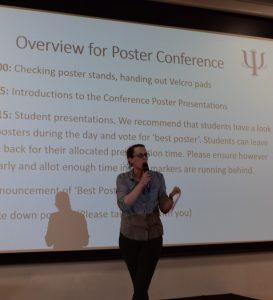Pictured: Jaidene Brown, Ian Hocking and Samantha Hodson.
It’s an interesting coincidence that, just a couple of days before our annual final-year poster conference, a Tweet from Nicola Abbott (@Abbott_Psych, formerly of CCCU Psychology and now at the UCL Institute of Education) alerted me to the Department for Education (DfE)’s astonishing call for universities to end grade inflation, by curbing unexplained increases in firsts and 2:1s awarded.
I have no intention to discuss the existence of grade inflation here. Any incentive towards grade inflation that exists at British universities has been created by a peculiar marketisation and gamification process, in which progression and completion rates, degree classifications, value-added statistics and student satisfaction (including satisfaction with assessment) are taken – pretty much uncritically – as indicators of quality. It patently makes no sense to set up such a system, create an injunctive norm (see Cialdini et al., 1990) to do better on these kinds of metrics, and then complain about grade inflation when universities do just that.
Rather, what worries me is the potentially destructive power of the discourse of grade inflation. Although the DfE news item does make the important distinction between grade inflation and grade improvements that happen for other reasons (“It is important to draw a distinction between grade inflation and grade improvement, where increased investment in teaching and facilities, as well as students working harder than ever, are leading to legitimate increases in grades”), its prominent denunciation of grade inflation makes this trope even more accessible in talk about student achievement. Exposure to this rhetoric can only have a demotivating effect.
A seminar reading that I used to give my social psychology students (Toland & Boyle, 2008) makes the crucial link between success, attributions about the reasons for success, and motivation. Essentially, the argument is that success isn’t motivating if attributed to external and/or uncontrollable factors (e.g. luck); but it does have a motivating effect if attributed to internal and controllable factors (e.g. effort). Cultivating the argument that improved student achievement is due to grade inflation is tantamount to saying that hard work makes little difference.

Incidentally, my favourite reply to the DfE’s post was a suggestion from @JoWolffBSG on 25 March to recalibrate time so that fewer people would be able to run a mile in four minutes.
Dr Dennis Nigbur, Senior Lecturer in Psychology
References
Cialdini, R. B., Reno, R. R., & Kallgren, C. A. (1990). A focus theory of normative conduct: Recycling the concept of norms to reduce littering in public places. Journal of Personality and Social Psychology, 58(6), 1015–1026. https://doi.org/10.1037/0022-3514.58.6.1015
Toland, J., & Boyle, C. (2008). Applying cognitive behavioural methods to retrain children’s attributions for success and failure in learning. School Psychology International, 29(3), 286–302. https://doi.org/10.1177/0143034308093674
 psychology
psychology Mark Titus
Mark Titus 1932
1932


